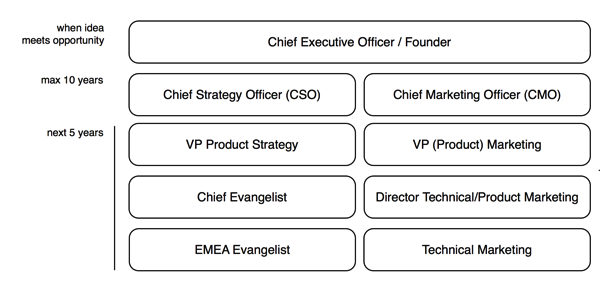Yesterday I shared for the first time some insights in how I got diagnosed with ADHD at age 30. It probably will not surprise you that discovering this so late in life has a huge impact of personal and professional life. In this first blogpost in a series of how I learn to deal with ADHD I’ll show my insights on how ADHD changes your career path decisions. Although it is specifically related to having ADHD, the logic kind of works for everyone!
Get out while you can!
I got diagnosed at a time where I was failing the majority of my job while still busting my ass off. At that time I still thought of myself being lazy and just efficient enough so I just had to try harder. After being diagnosed and knowing what that actually means I understood that trying harder was never going to be the answer. The combination of tasks and responsibilities that was my job was just not a fit for me and it would never be. So I left, instantly!
I have to add that by being so open about it towards management and HR, they stepped up and have supported me beyond their responsibilities. As I was not a threat to them in a sense of going to do the same for a competitor, I had perks probably no-one before me aver got. I could almost leave my job instantly (as I wasn’t performing anyhow) but I could also keep my company car and laptop as long as necessary to find a new job. THANK YOU!
TIP 1: if you are in a position that is hardly going to improve: get out while you can!

Strengths and Weaknesses
The single most important thing about being diagnosed is that I now know my weaknesses and I know I can’t really help it. I used to think I could do any job if only I tried hard enough. Now I know that being a project leader is just not mine to aspire. I’m a mess with my own schedule, let alone someone else’s. I now know that although I am good at selling stuff, I am not a good sales manager because I will forget to call back when necessary.
This self-reflection also gave me the opportunity to really look at what I am good at. And this gave me a lot of confidence I used to lack.
- I am good at absorbing new information (including technology) and instantly processing that knowledge in a usable context
- I have a natural ability to be so passionate about things it inspires other people
- Everyone wants to think outside the box. I don’t even have a box. I have seven engines running in parallel in my brain, giving me the ability to draw conclusions/decisions faster/more efficient than other people
- I have an unlimited resource of energy. With an average of 4hrs of sleep and a brain engine that has no off-switch I have twice as much time as a resource every single day. People that have followed me at conferences know what I mean 🙂
Shortly after I left that job I got picked up by Veeam to be their EMEA Evangelist. Basically just showing up 24/7 to be passionate about technology and spreading that passion throughout the world. It was an epiphany! This is what I was made for. This is what I was better at than anyone else just because of my strengths, despite my weaknesses. I have never been so happy in my life than that year!
TIP 2: find a job that fits your personality and you have an open door to happiness!

Ambition
Once you’ve done that self-reflection and know your weaknesses you get hit by that second wall: I will never be perfect at any job! There just are not a lot of jobs that don’t require performance related deadlines, that doesn’t require you to call back specific people on time, that is not filled with “great eye for detail”. While these are key breaking points for jobs that are designed around this (aka project manager), there are ways to cope with this for other jobs. Most of these ways require some help from the team and letting go of control. Some practical tips will follow in the next few posts.
I’ve recently summarised my probable career-path for the next decade(s) and I am sure you’ll notice I haven’t let go any of my ambitions. And you know what the fun part is? It doesn’t matter how fast or slow that goes, or even if I make it all the way up. As long as that path goes forward, I’ll be just fine. But I will always have to make sure I surround myself with the right people.
TIP 3: never lose your ambition but find a team that will support you!

For the bosses / colleagues
People who suffer (I hate this term) from ADHD have a certain disadvantage over people that don’t. They may require some kind of help being able to succeed in their job. Compare it do someone in a wheelchair. You don’t give that colleague a desk at the 5th floor if there is no elevator. So don’t force people with ADHD in an open office environment and ask them to focus on a specific task. Let the people decide what work environment they need to excel at their job. Some of them will ask for a clean desk policy so it avoid every possible way of distraction, others do need clutter around them to avoid their brain goes looking for distraction.
TIP 4: don’t push yourself / someone, to fit in. Be truthful to yourself at all time.
These were reflection tips on how to deal with career path feelings and using them in a long term plan. The next posts will focus more on actual practical tips like task management or day-to-day communication. I hope you enjoy the openness and feel free to keep the conversation going.
What’s Next?
- Making ADHD work – the story first | LINK
- Making AHDH work – the career-path | YOU ARE HERE
- Making ADHD work – I’ll do that in a minute | LINK
- Making ADHD work – wait, I had to pick up the kids? | LINK
- Making ADHD work – getting stuff done | LINK
- Do I have ADHD? | LINK
- My colleague has AD(H)D – what now? | LINK
Hans, let me congratulate you on this and the previous post.
An excellent piece!
I’ve found myself in a very similar experience (without the diagnose of ADHD.)
The ‘Peter Principle’ was the first eye opener for me.
It made so much sense and I’ve seen it happen day in, day out.
I’ll save you the entire story but in the end I got to a point where I became unhappy with what I was doing.
So I took the bull by it’s horns as they say.
After seeing a very good personal coach she helped me realize I was doing the wrong kind of work.
I started with an MBTI test that showed my strengths and weaknesses, after that it became pretty clear, I was not happy because I was doing the wrong type of work.
So I did what you did and quit my job.
I’ve a new opportunity coming up that suits me a lot more.
I’m pretty sure I will find happiness again and I will be able to achieve again.
What I’m basically saying is, if you have ADHD or not, it’s still important to discover what you’re good at and what not and then go look for a job that suits those characteristics.
I can tell solely by your enthusiasm that you found a job that suits you.
Having ADHD might as well be plus in your case.
That and having a great stomach to cope with the vodka 🙂
Keep it up Hans!
Regards,
Patrick
Thx Patrick. Exactly my point on this post. Whatever the condition, there may be more reasons why a specific job doesn’t fit you. Thats where this self-reflection post is universal to everyone.
Great article Hans!
I can imagine the impact it must have had, as you described. Good to see, read, that you have found a way to deal with it and use it to your advantage! I’m sure we’ll see you all the way ‘up there’ one day! Probably within 5 rather than 10 years from now 🙂 Good luck!
Regards,
Bas.
[…] had an introduction two days ago why I wanted to write some stuff on ADHD. Yesterday I shared some self-reflection tips on your career-path and feeling good about what you are doing. Today I'll start with practical life-hacks that make […]